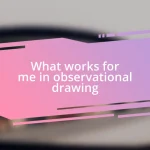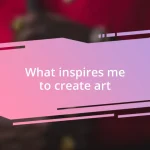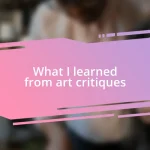Key takeaways:
- Strong communication and problem-solving skills are crucial for stage managers to navigate challenges effectively and maintain production flow.
- Proactive management of rehearsals, flexibility, and strategic scheduling enhance team morale and ensure smooth operations.
- Fostering a culture of openness and empathy within the team helps overcome obstacles and encourages innovative solutions to arise from collaborative efforts.

Essential skills for stage managing
In my experience as a stage manager, strong communication skills are absolutely vital. I remember a time when a last-minute cast change threw our entire production into chaos. By calmly coordinating with the director, crew, and actors, I was able to ensure everyone was on the same page. Isn’t it fascinating how effective communication can turn potential disasters into seamless performances?
Another essential skill is problem-solving. I recall an incident where we faced a major technical glitch just minutes before the show was set to start. My team and I had to think quickly on our feet, improvising solutions while keeping our cool. Have you ever been in a situation where creativity needed to kick in at a moment’s notice? For me, those high-pressure environments are where I discover my best self.
Lastly, organizational skills really make a difference in the smooth running of a production. I’ve learned that meticulous planning and time management can save countless headaches. During one show, I had to juggle multiple tasks at once—tracking props, coordinating rehearsals, and communicating with the lighting crew. How do you stay organized when the pressure mounts? I often relied on checklists and a good calendar, which helped me focus and keep everything in line.

Managing rehearsals and schedules
Managing rehearsals and schedules is an intricate dance that requires a blend of foresight and adaptability. I’ve often found that the key to a successful rehearsal lies in being proactive. I once faced a situation where I had to completely rearrange our rehearsal schedule due to an unexpected venue conflict. By swiftly communicating with each team member and re-prioritizing our goals, we managed to maintain our momentum. It was a refreshing reminder that flexibility often paves the way for creativity.
To effectively manage rehearsals and schedules, I’ve learned to embrace a strategic approach. Here are some practical tips that have worked for me:
- Create a detailed rehearsal schedule: This blueprint outlines what needs to be accomplished each day, keeping everyone aligned.
- Use digital tools: Utilizing apps or software for scheduling can streamline communication and provide easy access to updates.
- Build in flexibility: Allow for buffer times between rehearsals, accommodating unforeseen delays or extra practice when needed.
- Communicate regularly: Check in often to ensure everyone is well-informed about changes or expectations, minimizing confusion.
- Encourage feedback: Creating an environment where cast and crew can voice their concerns helps to identify potential scheduling conflicts early on.
In my experience, these strategies not only foster a sense of structure but also enhance team morale.

Communication strategies with the crew
Effective communication within the crew is the backbone of any successful production. I’ve discovered that establishing clear channels for sharing information is crucial. During one production, we faced a tight deadline, and miscommunication could have derailed our progress. I initiated daily check-ins, where everyone could voice their updates and concerns. This practice transformed our dynamic; it felt like we were all pulling in the same direction, which not only eased tension but also reinforced our collaborative spirit.
In my experience, non-verbal communication plays a significant role as well. I remember a show where technical cues were essential for timing. Our sound technician and I developed a system of hand signals to coordinate on the fly during performances. It was incredible how quickly we adapted, allowing for fluid interactions despite the hustle around us. Has anyone else found themselves relying on gestures or cues? It’s amazing how a simple nod or a raised hand can speak volumes.
Lastly, I’ve learned that fostering a culture of openness can dramatically improve communication. I’ve always prioritized inviting feedback and suggestions from the crew. Once, during a particularly challenging rehearsal, I encouraged team members to openly share their thoughts on how we could enhance our workflow. The insights they offered not only solved immediate issues but also built a trusting environment where everyone felt valued. It’s easy to forget that our crew members hold invaluable perspectives—what strategies have you found to encourage such openness? I personally cherish these moments, as they remind me that the most innovative solutions often come from collaborative efforts.
| Communication Method | Description |
|---|---|
| Daily Check-ins | Regular meetings to share updates and address concerns, fostering team alignment. |
| Non-verbal Cues | A system of gestures or signals to streamline communication, especially during performances. |
| Open Feedback Culture | Encouraging team members to share ideas and feedback, enhancing collaboration and innovation. |

Overcoming challenges during productions
I’ve faced my fair share of challenges during productions, and each one taught me something valuable about perseverance. One night, just hours before a major performance, we encountered a power outage that threatened to derail the entire show. My instinct was to remain calm and quickly shifted my focus to the immediate solutions. We transitioned to a more intimate lighting setup, and the cast adapted their performances beautifully. That moment not only showcased our resilience but also reminded me how creative we can be under pressure. Have you ever had to think on your feet like that?
There’s also the issue of unexpected changes in the cast or crew. I remember when a primary actor fell ill just days before opening night. The panic was palpable; however, I gathered the team to figure out our options. We decided on an understudy who had been diligently preparing. Watching them step into the role with confidence was awe-inspiring. It’s remarkable how challenges can sometimes lead to unexpected triumphs, isn’t it?
Additionally, I’ve learned that building strong relationships within the team makes overcoming obstacles much easier. During one production, I had to mediate a conflict between two team members who were struggling with communication. Instead of avoiding the situation, I scheduled a casual lunch to discuss our shared goals. It was surprising to see how a little empathy and understanding transformed their dynamic. Strengthening connections can really make a difference when it’s crunch time—what have you done to foster such relationships in your teams? I believe these moments of vulnerability are often the glue that holds us together.

Tips for effective problem solving
I’ve discovered that a proactive mindset can be a game-changer in problem solving. For instance, during a particularly chaotic rehearsal, I noticed the crew seemed bogged down by unforeseen delays. Instead of waiting for issues to pile up, I organized a brainstorming session where everyone could voice their concerns and propose solutions. This approach not only cleared the air but also empowered each member to take ownership of the challenges we faced. Have you ever seen how a collaborative atmosphere can spark creativity? It’s truly refreshing to witness.
Another key tip is to maintain flexibility amidst chaos. I remember a day when our stage setup was abruptly altered due to a last-minute creative decision. Initially, I felt a surge of panic, but I quickly reminded myself to adapt rather than resist. We ended up reworking our timelines and allocating roles differently, which ultimately enhanced our production. Challenges become less daunting when you embrace fluidity—what techniques have you used to maintain flexibility in your projects?
Finally, I find that keeping a positive outlook is essential. It might sound cliché, but positivity fosters resilience. In one production, I encountered a tightly budgeted scenario that limited our resources. Instead of focusing on what we lacked, I encouraged the team to see it as an opportunity for innovation. We collaborated to create unconventional yet captivating solutions, which not only saved costs but led to an unforgettable show. Have you noticed how a simple shift in perspective can open up a world of possibilities? That’s the magic of problem solving—unlocking creativity in the face of challenges.














